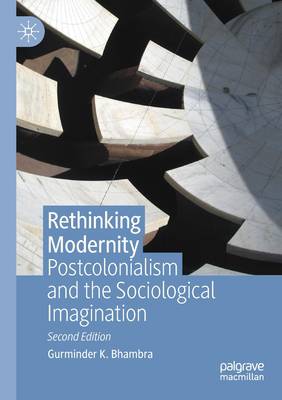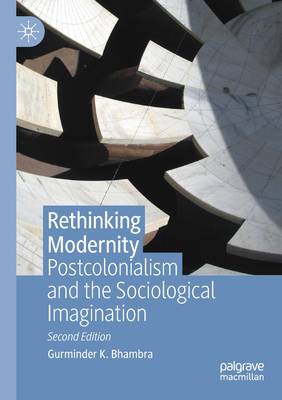
- Afhalen na 1 uur in een winkel met voorraad
- Gratis thuislevering in België vanaf € 30
- Ruim aanbod met 7 miljoen producten
- Afhalen na 1 uur in een winkel met voorraad
- Gratis thuislevering in België vanaf € 30
- Ruim aanbod met 7 miljoen producten
Zoeken
Rethinking Modernity
Postcolonialism and the Sociological Imagination
Gurminder K Bhambra
Paperback | Engels
€ 40,45
+ 80 punten
Uitvoering
Omschrijving
The second edition of this influential book addresses how the experiences and claims of non-European 'others' have been rendered invisible to the standard narratives and analytical frameworks of sociological understandings of modernity. In challenging the dominant, Euro-centred accounts of the emergence and development of modernity, Bhambra puts forward an argument for 'connected histories' in the reconstruction of historical sociology at a global level. This updated version of the original, published in 2007, adds a new preface which explores key themes that Bhambra has further developed over the intervening years: specifically, how the rethinking of modernity enables us to reconstruct sociology and a call for a 'reparatory sociology' committed to the repair of the social sciences and the securing of global justice.
Specificaties
Betrokkenen
- Auteur(s):
- Uitgeverij:
Inhoud
- Aantal bladzijden:
- 257
- Taal:
- Engels
Eigenschappen
- Productcode (EAN):
- 9783031215391
- Verschijningsdatum:
- 17/02/2023
- Uitvoering:
- Paperback
- Formaat:
- Trade paperback (VS)
- Afmetingen:
- 148 mm x 210 mm
- Gewicht:
- 358 g

Alleen bij Standaard Boekhandel
+ 80 punten op je klantenkaart van Standaard Boekhandel
Beoordelingen
We publiceren alleen reviews die voldoen aan de voorwaarden voor reviews. Bekijk onze voorwaarden voor reviews.











